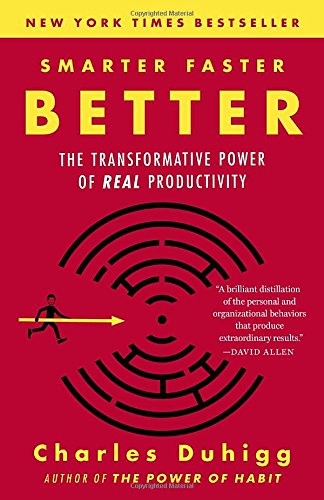Who doesn't want to be more productive?
Whether you're rushing to submit a book to your publisher, completing a proposal for a huge client, or finalizing that new app your team has been working on, being smarter, faster, and better will not only help you get the job done but also do so in an efficient and effective manner.
If you're curious as to how you could be all these things, then the latest bestseller from Pulitzer Prize winner and New York Times reporter Charles Duhigg, Smarter, Faster, Better, is for you.
In his latest book, Duhigg distills several themes critical to being more productive such as motivation, focus, goal-setting, decision-making, absorbing data, and managing others. Taken from his own experience with completing this book, he provides engaging stories and case studies on how productivity works and how we can apply those same principles to our mental processes and daily actions to be our most productive selves.
Here are my 3 Takeaways:
1. Establish Your "Why" and Make Small Decisions
When it comes to getting things done, motivation is oftentimes the bottleneck that prevents or prolongs completing a task or project. And since our productivity is affected by our motivation (or lack thereof), the author suggests establishing your "why" and making small decisions.
He explains that it would be much easier to act once we’re clear on why we need to act — when we can identify the underlying reason for getting something done when we care about something, and when we know the consequences or rewards of doing (or not doing) something.
If you ever find yourself lacking in motivation, learn to establish or reconnect with your “why” and be sure to start practicing making decisions and exerting your willpower, no matter how trivial the act may be. In fact, it’s better to seek out the small opportunities that give you a sense of control so as to gain momentum while doing a particularly difficult task. You’ll find that eventually, working on the task will be easier and more automatic.
2. Create Mental Models
The author explains the importance of creating mental models. Also known as mental forecasting, this process helps us anticipate and prepare for possible scenarios that we would otherwise be stressed about or fail at.
The reason for this is that although habits and routines are certainly essential to being productive, these can sometimes cause tunnel vision and cloud our judgment when we encounter circumstances that are out of our control.
The author suggests getting in the habit of telling ourselves stories and answering questions such as:
What distractions might I encounter?
How should I handle these distractions?
What does success look like for me?
How will I know when I will have succeeded?
What are my next actions?
*Affiliate Link
3. Being Productive Also Means Being Creative
Being productive doesn’t just mean applying the best tools or implementing the latest strategies. Oftentimes, productivity entails creativity in the most innovative sense.
Imagine you’re living in the 19th century and everyone is using horses as the main form of transportation. If you were simply trying to get to your destination sooner, then you would probably train horses to be faster. But if you wanted a different and more efficient method of traveling, then you’d have used an internal combustion engine to power a car.
The same innovative spirit is the reason for many discoveries and technologies we have today. Usually, it’s the ability to recognize and harness what others may have overlooked that makes us more productive. As Steve Jobs said, “Creativity is just connecting things.”
Sometimes, innovativeness also comes at a price. While sparks of inspiration may appear at seemingly random moments, a portion of creative breakthroughs are results of stressful and difficult situations. The author reminds us that oftentimes, fear and stress aren’t an end in themselves but necessary obstacles that pave the way for creativity as long as we push past them.
Want to read this book yourself?
Click here to grab your copy of Smarter, Faster, Better from Amazon.com*
Or get two free audiobooks from Audible*.
*Disclosure: These are affiliate links which means if you click and purchase, I may receive a commission at no extra cost to you.
3 TAKEAWAYS
Since one of the best ways to improve ourselves is to commit to continuous learning, this post is part of the blog mini-series called 3 Takeaways where I discuss three insights from thought-provoking leaders, books, and podcasts.
My purpose initially was to simply read more books, but the learnings were too valuable to keep to myself. My goal has since been to share the vital lessons that will help you be productive and free.
Want to be productive while growing your dream business?
We have over 40 sets of strategic time-saving templates that can help!





















![One Page Media Kit [A] - Navy Blue](https://images.squarespace-cdn.com/content/v1/5849ea99ff7c5026f7bfdc54/1674690328865-341R6EI9WBSEY2RKRDEM/59.jpg)
![One Page Media Kit [B] - Navy Blue](https://images.squarespace-cdn.com/content/v1/5849ea99ff7c5026f7bfdc54/1674704094394-SDRNSKWBM03DK2Y5094N/60.jpg)










